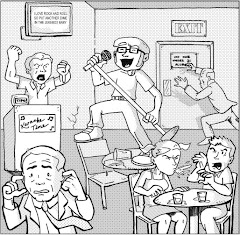Content #1, March 2002, published by Di
by Gia-Bao Tran
If last month's theme was first issues, this month's is independent titles. I don't have a problem with that. One of the benefits of kicking off this challenge the same month of Comic Con, I suppose.
Content was one of the few Small Press titles I actually purchased; the rest, like Saturday's God the Dyslexic Dog, were kindly offered for free. At the Con, where the senses are overloaded with graphic, visual stimuli (i.e. Storm Troopers and Klingons), the challenge of any comic distributor -- from retailers to corporate publishers to Small Press exhibitors, is to stand out. Folks like DC Comics and TokyoPop have the benefit of space (which in itself is a benefit of budget), so the only thing the little guy can really depend on is his product. Content is this product.
Content passed the "flip test" -- that initial thumbing through of the pages to determine if the art style was something I could enjoy. See, I'm a story man, so I'm happy if I can tolerate the art. Following the flip is the skim -- the perusal of some captions or word balloons to get a grip on the narrative and tone. A varied art style to express a different aspect of the story, like a flashback or dream sequence, usually helps the skim. Content had it all. I dropped the three bucks. In Small Press, that's a gamble.
It paid off. Content #1 was the perfect book to read with a hot cup of coffee on an overcast day like today. It exudes mood without sap; it expresses emotion without baggage. The story focuses on an experiment during which the subject sleeps and dreams of his future self. The scientific jargon isn't as important as the relationship between the tester, the dreamy Stefania, and the testee, the geeky Elin. After a few failed attempts at flirting, Elin experiences the experiment and it works -- he sees his future self, but also his younger self, who confronts him briefly before the test abruptly ends. The rest of the issue tells the tale of Elin's attempts to befriend his inner child; the experiment has a limited lifespan, and each time Elin delves into his mind, he emerges unsatisfied with the results. The twist is, after scoring the girl and an apparently content life, he cannot help but return to his mind one more time, the last time, and his desperation costs him everything. I'd like to say I didn't see that one coming, but even though I did, the impact was still emotional effective. Gia-Bao Tran tells a good visual story.
The basis of this story has hints of The Matrix and Vanilla Sky, but with more of a Being John Malkovich sense of disorientation and dreamy surrealism. I'll confess that Tran lost me a few times, but the story never lost its structure, and I wonder, was I supposed to wonder how affecting a dream would alter Elin's reality? The point deals less with the logistics of life as it does the essence of self-esteem. Elin demands his third grade self to be happy, no matter what happens (so, we are to assume something happens). Did Elin actually believe that his younger self would heed this advice, thus erecting a more pleasurable life when he woke up? In a true tale of time travel, the changes would ripple from external circumstances; interestingly, in Content, the ripples come from within. The true nature of change, eh?
Story, art, and a few lingering afterthoughts. Just what I like in a comic. I wonder if this is an episodic series, like Brian Wood's Demo, featuring different characters every time, or if we actually see Elin again in the subsequent installments. Frankly, I'm done with Elin. The guy doesn't know how to appreciate what he has. Me, I'm content with Content.
Er, sorry. Had to be said.
Monday, August 07, 2006
Subscribe to:
Post Comments (Atom)



No comments:
Post a Comment